‘False prophet’: Duterte, the Catholic Church and the fight for the soul of the Philippines
March 30, 2017 · By Emily Rauhala for www.washingtonpost.com
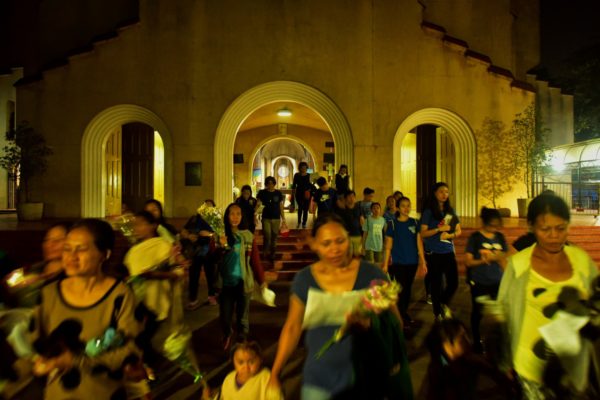
Relatives and friends of victims of extrajudicial killings leave Manila’s Baclaran Church for a vigil Feb. 17, 2017. (Jes Aznar/For The Washington Post)
MANILA — A world of sin. A weary savior. Filipinos know the story well.
Since coming to power last summer, President Rodrigo Duterte has used biblical language to build a case for mass killings, vowing to sacrifice himself, even his son, to cleanse the nation of crime.
Conjuring a world in which evil stalks the innocent, Duterte launched a wave of violence that has claimed at least 7,000 lives. With his critics cursed and shamed, and with public support for the president running high, the establishment, including the Roman Catholic Church, has for the most part stayed quiet.
But now, more than seven months into Duterte’s tenure, with the death toll climbing night by night, the country’s Catholic hierarchy is finding its voice. In a pastoral letter published in February, church leaders denounced Duterte’s campaign as a “reign of terror” against the poor
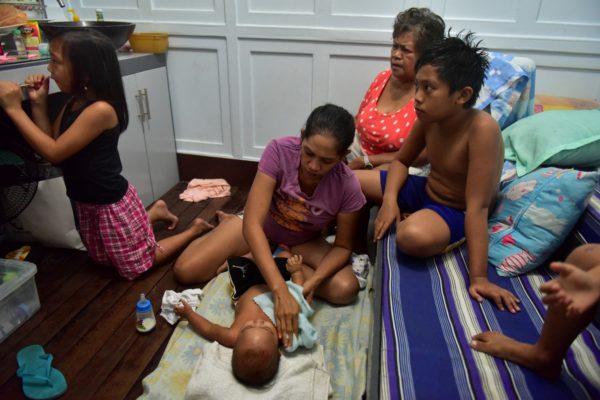
The de Chavez family shelters in February in Baclaran Church after men thought to be police killed a family member suspected of drug ties. The rest of the family fears being wiped out by police in President Rodrigo Duterte’s drug war. (Jes Aznar/For The Washington Post)
Emboldened by their bishops’ stance, priests, nuns and missionaries are also taking a stand, offering sanctuary to fearful witnesses, paying for funerals and organizing rallies. Religious leaders who once supported the president are turning their backs on him, potentially hurting his political appeal.
At stake are the lives of thousands and the credibility of an institution that has long been at the heart of Philippine life. Religious leaders helped to topple the dictator Ferdinand Marcos in 1986 and have since led campaigns for environmental and civil rights.
Yet many see the role of the Catholic Church receding. Critics, including Duterte, accuse church leaders of corruption. The bishops have abandoned their role as a national conscience, allying themselves instead with the oligarchic ruling class, their critics say.
Some priests, including the Rev. Joel Tabora, who heads a university in Duterte’s home town, initially backed the president because he had vowed to return power to the ordinary Filipino by forcefully tackling crime.
Last month, with evidence of police impunity mounting, Tabora wrote a letter condemning the president. “My vote for Rodrigo Roa Duterte was a vote for him as president of the Philippines. It was not a vote for him as God. Nor a vote for him as the Evil One,” Tabora wrote.
But Duterte delights in dancing with the devil. When the bishops denounced the killing spree, he did not repent. “I will go to hell,” he told his countrymen. “Come join me.”
‘Messiah complex’
Filipinos like to joke that they are more Catholic than the pope. The country bans not only abortion, but also divorce, and some priests oppose the use of condoms because they are not conducive to a “culture of life” — and that makes Duterte’s rise all the more remarkable.
Philippine political leaders have learned to cater to the church’s agenda. More than 80 percent of Filipinos are Catholic or identify as Catholic, making the faithful a potent political force.
When Duterte entered national politics after being a longtime vice mayor and mayor in the southern city of Davao, he did not court the clergy — he attacked them. As a child, he was molested by a priest, he said. The church, he declared, is full of hypocrites.
Duterte offered Filipinos a different sort of salvation. He did not want to be president, he said, but if the people needed him — and they needed him — he would “kill all” the country’s criminals in six months, dumping bodies until the “fish will grow fat.”
As president, he has delivered on the promise of bloodshed, exhorting the police to kill and assuring them that he, not they, will suffer any consequences.
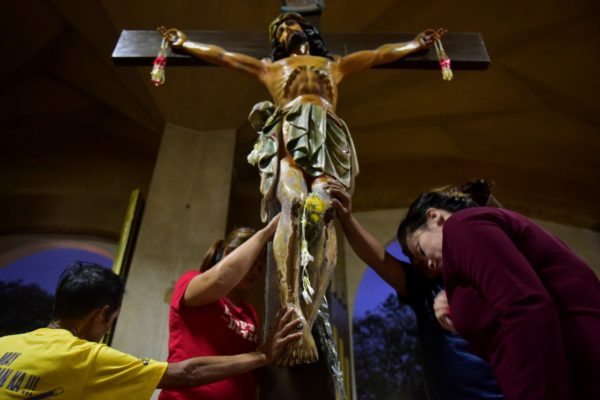
At Manila’s National Shrine of Our Mother of Perpetual Help, also known as the Redemptorist Church or Baclaran Church, devotees have long sought help in their troubles. The church speaks out strongly against extrajudicial killings. (Jes Aznar/For The Washington Post)
The Rev. Amado Picardal, a Catholic priest who has followed the president since his days as the “death squad mayor” of Davao, has spent years contemplating why so many Filipinos fall in behind this “false prophet.”
“Duterte says, ‘What I am doing is justified because I am eliminating evil. They don’t have souls. They are killers,’ ” Picardal said. “It’s really a messiah complex. It’s that idea of total power and control. He is God. He is the law.”
For Filipinos fed up with crime and outraged by corruption, Duterte’s bold promises are appealing. The problem, said the Rev. Bobby dela Cruz, a former drug dealer who now works with drug users, is that there is no room for rehabilitation or forgiveness.
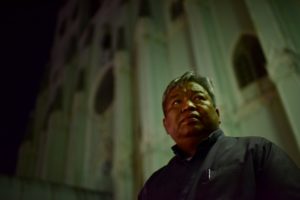
The Rev. Bobby dela Cruz outside San Sebastian Church in Manila. (Jes Aznar/For The Washington Post)
Those included on Duterte’s “drug lists” are often killed before they have a chance to clear their names. They will never get a day in court. “God is merciful,” dela Cruz said. “Duterte is not.”
‘Pray for us’
Fear of a Duterte outburst had kept church leaders quiet for too long, several priests said. Some have been supporting drug-war victims behind the scenes for months. Now, with the bishops behind them, a few are opening up about their activism and urging others to join.
In Manila, the National Shrine of Our Mother of Perpetual Help, known variously as the Redemptorist Church and Baclaran Church, has opened its gates and doors, providing sanctuary to a small number of at-risk witnesses.
In late February, the church hosted the mother, sisters, nieces and nephew of a transgender woman named Heart who was dragged from her home and shot dead shortly after an altercation with police, as well as Ryan, an 18-year-old witness to a shooting that killed seven, including three of his teenage friends.
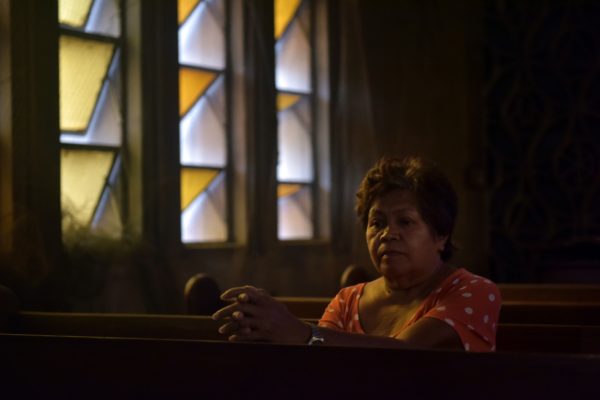
Elena de Chavez, 61, whose transgender daughter Heart was killed Jan. 10 in Navotas City, near Manila, by men believed to be police, meditates Feb. 17, 2017, in Redemptorist Church in Manila, where she and the rest of her family found refuge. (Jes Azna/For The Washington Post)
In the hardest-hit communities, which are disproportionately poor, losing family members, especially breadwinners, is catastrophic. Baclaran is using its funds to pay funeral expenses, said Brother Jun Santiago, a missionary who helps affected families, and to assist survivors in getting back on their feet.
Across the city, the poorest parishes are struggling to help people come to terms with the trauma of state-backed killings. The Rev. John Era, who studied psychiatry in the United States before returning to the Philippines last fall, said people have seen relatives shot or have stumbled upon their bodies. In the United States, such emotional trauma might lead to years of counseling — something nobody in his community can afford.
The Rev. Gilbert Billena, a priest who once supported Duterte, said Catholics have a duty to help those in need — and small numbers are.
A bigger challenge, he said, is convincing the country that killing in the name of stopping crime is cruel and counterproductive, a strategy more likely to compound poverty than to wipe our crime.
“With 7,000 killed, I think something has to be done as a people,” he said. “Duterte promised change to the masses, to the poor, but what kind of change can there be when you are being summarily killed?”
Those with influence must be brave enough to challenge a president who does not fear God or anybody else, he said. He hopes more people of influence will do so.






